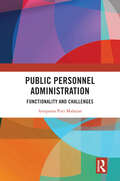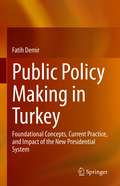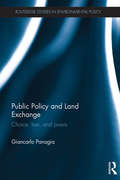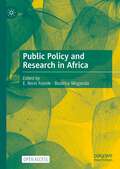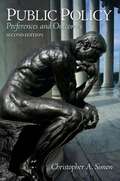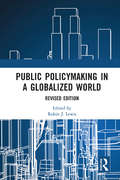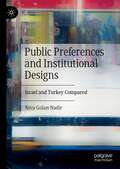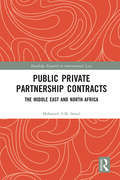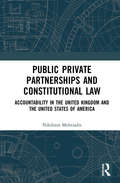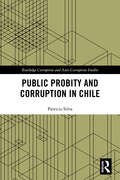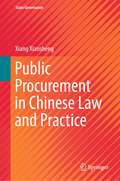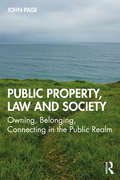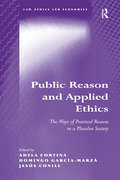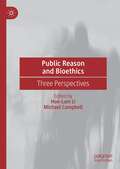- Table View
- List View
Public Passions: The Trial of Shi Jianqiao and the Rise of Popular Sympathy in Republican China
by Eugenia LeanIn 1935, a Chinese woman called Shi Jianqiao murdered the notorious warlord Sun Chuanfang as he prayed in a Buddhist temple. This work of history examines this crime and the highly sensationalized trial of the killer. In a fascinating investigation of the media, political, and judicial records surrounding this cause celebre, Eugenia Lean shows how Shi Jianqiao planned not only to avenge the death of her father, but also to attract media attention and galvanize public support.
Public Personnel Administration: Functionality and Challenges
by Anupama Puri MahajanThis book addresses the processes and concerns within the purview of public personnel administration which is the key to success in carrying out governmental responsibilities and duties. With special focus on Indian administrative system, this volume probes into how public personnel administration is a critical aspect of the public sector that involves enhanced management of human resources. It also studies the evolution of public personnel administration in countries like the USA, UK, France, and Germany. Besides discussing the personnel processes in the post pandemic age, the book also examines the challenges that governments face on a global level. This title will be useful to students, researchers and teachers of Public Administration, Public Policy, Political Science, and General Management. The book will also be an invaluable companion to the policymakers in the government sector as it will strengthen their conceptual understanding of the subject.
Public Policy Making in Turkey: Foundational Concepts, Current Practice, and Impact of the New Presidential System
by Fatih DemirThis volume discusses public policy making in Turkey. Using Turkey as an overarching case study, the author presents foundational concepts of public policy analysis. The method followed in the book is from general to specific: in each chapter, the relevant public policy stage or concept is explained and discussions from international literature are provided first. Then, Turkish cases are presented and clarified using theoretical concepts and debates. Additional examples from other municipalities are included for a comparative perspective. This volume will be of use to researchers and students studying public policy, policy analysis, and global public administration as well as professionals, policymakers, and diplomats working in the Turkish public sector.
Public Policy and Land Exchange: Choice, law, and praxis (Routledge Studies in Environmental Policy)
by Giancarlo PanagiaThis original contribution to the field is the first to bring economic sociology theory to the study of federal land exchanges. By blending public choice theory with engaging case studies that contextualize the tactics used by land developers, this book uses economic sociology to help challenge the under-valuation of federal lands in political decisions. The empirically-based, scholarly analysis of federal-private land swaps exposes serious institutional dysfunctions, which sometimes amount to outright corruption. By evaluating investigative reports of each federal agency case study, the book illustrates the institutional nature of the actors in land swaps and, in particular, the history of U.S. agencies’ promotion of private interests in land exchanges. Using public choice theory to make sense of the privatization of public lands, the book looks in close detail at the federal policies of the Bureau of Land Management and the U.S. Forest Service land swaps in America. These pertinent case studies illustrate the trends to transfer federal lands notwithstanding their flawed value appraisals or interpretation of public interest; thus, violating both the principles of equality in value and observance of specific public policy. The book should be of interest to students and scholars of public land and natural resource management, as well as political science, public policy and land law.
Public Policy and Research in Africa
by E. Remi Aiyede Beatrice MugandaThis open access book responds to the need for a specifically African focus on public policy. It outlines the fundamental principles of public policy research, and engages with major issues in the study of public policy from an African perspective, covering essential topics such as the location and centrality of social sciences in relation to public policy, leadership, methodology, institutions, governance, and gender. This book is essential for understanding the various aspects and dimensions of policy making in Africa that underscore quality research and are at the core of excellence in teaching and learning.
Public Policy in the 'Asian Century'
by Helen Sullivan Sara Bice Avery PooleThis volume explores the defining features, critical approaches, challenges and opportunities for public policy in the 'Asian Century'. This is the first book to systematically analyse the key institutions and practices that comprise public policy, administration and governance to investigate how they are changing in the context of increasing Asian influence. Its authors argue that the Asian Century holds the potential to generate a paradigm shift equivalent to the impacts of neo-liberalism and the New Public Management of the late 20th century. Divided into three parts, this volume interrogates the theories underpinning contemporary public policy; explores case studies from different policy arenas across the Asian region; and imagines what a future of globalised public policy might look like. It examines the implementation measures necessary to support policy and administration in an era of transnational governance networks, tightly linked economic markets and progressively fluid cultural exchanges. This book provides the concepts and tools necessary to navigate these shifting sands successfully. It is essential reading for scholars of public policy, public management, international relations, and politics and social sciences, as well as for administrators and public servants.
Public Policy: Preferences and Outcomes (Second Edition)
by Christopher A. SimonBy combining normative and empirical perspectives, Christopher A. Simon's second edition of Public Policy encourages the next generation to of policy makers to think both practically and philosophically throughout the policy process. This second and heavily revised edition covers the historic background, political science, and philosophical values of public policy. Chapters conclude with a case study, engaging students in applying their theoretical knowledge in practical terms, and encouraging them to be informed and active citizens.
Public Policymaking in a Globalized World: Revised edition
by Robin J. LewisThe inexorable advent of globalization has transformed the public policymaking process into a multi-faceted challenge that transcends traditional policymaking boundaries and forces scholars, experts, and practitioners to redefine their field in terms of both theory and practice. While every policy dilemma has a specific location in time and space, most significant policy issues— climate change, food and water, economic development, global pandemics, terrorism and violence, and migration, to name just a few—now require a collective framing of the problem and a collaborative effort to take effective action. The essays in Public Policymaking in a Globalized World offer valuable insights into how policymaking is evolving from a circumscribed field of inquiry into a truly global dialogue that can help stakeholders to focus on key issues that threaten the survival of our planet.
Public Practice, Private Law
by Gary ChartierMarriage is ordinarily a public practice, supported by, as well as supportive of, society. But it need not fall within the purview of the state. Public Practice, Private Law articulates a conception of marriage as a morally rich and important institution that ought to be subject to private rather than legislative or judicial ordering. It elaborates a robust understanding of marriage that captures what both different-sex and same-sex couples might see as valuable about their relationships. It explains why sexual ethics won't yield a normative model of marriage, and why the kind of marital love worth wanting, can. It goes on to show how an understanding of marriage as rooted in demanding commitments can allow for divorce before arguing that the state should cease to sponsor marriages. It concludes by suggesting that both state and non-state institutions should acknowledge the marriages of same-sex couples.
Public Preferences and Institutional Designs: Israel and Turkey Compared
by Niva Golan-NadirThis book explores the existence of gaps between public preferences and institutional designs in democracies, and specifically cases in which such gaps are maintained for a long period of time without being challenged by the electorate. Gaps such as these can be seen in the complex relations between the state and religion in Israel and Turkey, and more specifically in their policies on marriage. This line of investigation is interesting both theoretically and empirically, as despite their poles apart policies, Israel and Turkey share a similar pattern of institutional dynamics. Existing explanations for this phenomenon suggested either civil society-based arguments or intra-institutional dynamics, as reasons for the maintenance of such gaps. This book enriches our understanding of policy dynamics in democratic systems by introducing a third line of argument, one that emphasizes the effective role state institutions play in maintaining such arrangements for long periods, often against the public will.
Public Private Partnership Contracts: The Middle East and North Africa (Routledge Research in International Law)
by Mohamed AM IsmailThis book provides a comprehensive overview of the law surrounding PPPs in the Middle East and North African region. The significance of liberalised and integrated Public Private Partnership Contracts as an essential component of the world legal and policy order is well documented. The regulation of PPPs is justified economically to allow for competition in the relevant public service and to achieve price transparency, thus resulting in significant savings for the public sector. In parallel to the economic justifications, legal imperatives have also called for the regulation of PPPs in order to allow free movement of goods and services and to prohibit discrimination on grounds of nationality. The need for competitiveness and transparency in delivering public services through PPPs is considered a safeguard to achieve international standards in delivering public utility services. First, it assesses the compatibility of the current PPPs legislation and regulation in the MENA region with the international standards of legislation and regulation prevalent in many other countries, including the UK, France and Brazil. Secondly, it compares the practices in the MENA region with those of international bodies such as the OECD and World Bank. Comparisons are then made between the MENA countries and those in Europe and Asia with regard to the influence of culture, policy and legal globalization. The book will be of interest to scholars and students in the field of international contract law, public law and state contracts, finance law and private law.
Public Private Partnership for Desertification Control in Inner Mongolia
by Yong Gao Zhongju Meng Xiaohong DangIn terms of China’s current situation, the prevention and control of land degradation and the development of innovative sustainable land management activities lie within the purview of public works. Further, public-private partnerships (PPPs) hold considerable potential for application in this field. Inner Mongolia is one of the Chinese provinces hardest hit by land degradation. Fortunately, after years of dedicated efforts, meaningful achievements have been made: the increasing participation of the people as a whole, combined with growing investments in land degradation prevention and ecological construction on the part of private enterprises, has to some extent compensated for the lack of government involvement. Further, Inner Mongolia has been a pioneer in the use of PPPs for the prevention and control of land degradation, which has yielded numerous ecological, social and economic benefits. To better promote the development of ecological construction and expand the participation in land degradation control, this book systematically studies the use of PPPs in the Inner Mongolia autonomous region, drawing on field investigations and case analyses to do so. Its main goal is to explore a public-private partnership model that can effectively expand the scale of investment in land degradation prevention and sustainable land management.
Public Private Partnerships Renegotiations in Transportation: Case Studies from Portugal (Competitive Government: Public Private Partnerships)
by Carlos Oliveira Cruz Joaquim Miranda SarmentoThere is a growing interest in Public-Private Partnerships (PPPs), particularly in infrastructure and public services. Under the scope of PPPs, renegotiations are becoming more relevant, as empirical evidence suggests that most PPP projects are inevitably renegotiated, i.e., the original contract needs to be adapted to new and unforeseen circumstances. Renegotiations have a substantial impact on the contract and performance of a PPP and usually represent significant costs for users and taxpayers. However, very little is known about the management and, mainly, the process of renegotiating that will, very likely, occur. This book provides a set of case-studies of PPP renegotiations in the transport sector. The authors illustrate the Portuguese experience, a country that has been using PPP extensively, particularly in transport. The case studies provide an extensive and detailed analysis on each aspect of the project and the renegotiation. What drives renegotiations? Why are some projects more renegotiated than others? What are the results? How can the performance of renegotiation processes be improved? These and other questions provide the basis for the discussions in this book. The novelty and value of the book come mainly from the extent of information available. Each case-study deals with these questions in much more detail than what is common in the case-studies approach.
Public Private Partnerships and Constitutional Law: Accountability in the United Kingdom and the United States of America
by Nikiforos MeletiadisAnnually, the government commits significant expenditure to a type of public contracts which are known as Public-Private Partnerships (PPPs) or the Private Finance Initiative (PFI). These contracts bind the public purse for decades in sectors such as Health, Defence and Detention, and involve the assignment of a significant role to the private sector in the provision of public services. This book explores the controversial subject of the public accountability of these contracts, and the corresponding large sums of public money involved. It explains how public accountability works for PPPs and the PFI, and it argues that it should be provided as part of the Economic Constitution. Drawing comparative understandings from the UK and the USA constitutional legal traditions, the book investigates public accountability from the perspective of the Economic Constitution, focusing on three accountability criteria - legal, accounting and administrative. In doing so, it provides an analysis which informs both from the perspective of academic research and from that of legal and consulting practice.
Public Private Partnerships: Construction, Protection, and Rehabilitation of Critical Infrastructure (Competitive Government: Public Private Partnerships)
by Simon Hakim Robert M. ClarkThis book discusses Public-Private Partnerships (PPPs) and their potential to protect and maintain critical infrastructure in a variety of global governmental settings. Critical infrastructure is defined as essential services that underpin and support the backbone of a nation's economy, security, and health. These services include the power used by homes and businesses, drinking water, transportation, stores and shops, and communications. As governmental budgets dwindle, the maintenance of critical infrastructure and the delivery of its related services are often strained. PPPs have the potential to fill the void between government accounting and capital budgeting. This volume provides a survey of PPPs in critical infrastructure, combining theory and case studies to provide a comprehensive view of possible applications. Written by a diverse group of international experts, the chapters detail PPPs across industries such as transportation, social infrastructure, healthcare, emergency services, and water across municipalities from the US to New Zealand to Hong Kong. Chapters discuss objectives and legal requirements associated with PPPs, the potential advantages and limitations of PPPs, and provide guidance as to how to structure a successful PPP for infrastructure investment. This book is of interest to researchers studying public administration, public finance, and infrastructure as well as practitioners and decision makers interested in instituting PPPs in their communities.
Public Private Partnerships: Principles for Sustainable Contracts
by Veronica Vecchi Francesca Casalini Niccolò Cusumano Velia M. LeoneBy merging public and private tangible and intangible capitals, Public Private Partnerships contracts (PPP) are fundamental to generate public value and to support economic and social development; in the aftermath of Covid-19 pandemic, they prove critical to pave the way for the recovery. This book is intended to support the co-evolution of the main public and private players involved in PPP contracts for infrastructure and service delivery, by providing principles, based on the academic and professional experience of the authors, that can be applied across sectors and jurisdictions. Drawing on the framework of public-private collaborations at macro, meso and micro level, this book provides a practical perspective on the most relevant legal, financial and contractual issues of PPP contracts for infrastructure and service delivery.
Public Probity and Corruption in Chile (Routledge Corruption and Anti-Corruption Studies)
by Patricio SilvaIn most Latin American countries, key officials and political figures have been involved in big corruption scandals in the last decade, leading to a rigorous academic debate on the possible socio-economic, political and cultural factors responsible for corrupt practices across the region. This book takes a different approach by focusing on Chile, which shows the lowest levels of corruption in the region. Instead of analysing notoriously bad cases in Mexico, Argentina, Brazil and Venezuela, this book explores the factors which have led to a relatively high degree of public probity among power holders in Chile. Public Probity and Corruption in Chile presents a long-term historical analysis demonstrating that public probity in Chile has its roots in the colonial period, and that public and state responses have historically shown a low level of tolerance for public cases of corruption. In particular, the author highlights the role played by relative poverty and lack of resources, geographical remoteness, the impact of the Arauco War against the Mapuche people, the militarisation of both government and public administration, the extreme oligarchic nature of the Chilean aristocracy, the early consolidation of state institutions and the rule of law, high levels of political stability and the role played by patriotism. Studying an example of better practice in detail in this way provides valuable insights into the factors and actors which can help to prevent or to revert the phenomenon of public corruption in the region more generally. As such, this book will be of interest to researchers of corruption and public probity both in Chile and further afield.
Public Procurement Reform and Governance in Africa
by S. N. NyeckThis book presents an interdisciplinary exploration of the governance of public procurement reform in Africa. Through a bottom-up approach to case studies and comparative analyses, scholars, practitioners, and social activists write about the organizational mechanisms and implementation gaps in public procurement governance in light of the general premises of national reform. Reforming the ways in which government purchases works, goods, and services from the private sector is one of the most sweeping policy reform undertaken in Africa in the past decade. Despite the transnational scope of policy change, very little is known about the mechanisms of public procurement governance at the subnational level. The argument in this volume is that policy reforms that mitigate contractual hazards along the three-dimensional "law-politics-business matrix" are more likely to bring about meaningful institutional transformation and broader social accountability. Key to substantive transformation of public procurement is the revitalization and professionalization of the public sector to meet the opportunities and challenges of development by contract.
Public Procurement Regulation in Africa
by Sue Arrowsmith Geo QuinotPublic procurement regulation in Africa is not widely researched. To address the shortage of scholarship in this area and to promote future research, this book analyses the law governing public procurement in a number of African systems and looks at key themes relevant to all African states. Part I discusses the regulatory regimes of nine African systems using a common framework, providing both a focused view of these African systems and an accessible comparative perspective. In Part II, key regulatory issues in public procurement that are particularly relevant in the African context are assessed through a comparative approach. The chapters consider the influence of international regulatory regimes (particularly the UNCITRAL Model Law on procurement) on African systems and provide insights into the way public procurement regulation is approached in Africa.
Public Procurement in Chinese Law and Practice (State Governance)
by Xiang XianshengThis book aims to present an overview of government procurement of public services in China. It introduces three types of government procurement of public service and analyzes the legal boundaries, legal subjects, purchasing methods, regulation and legal remedy system around it. At the end, the ways of improving law system are brought up for policy suggestion. It helps readers understand how procurement of public services proceeds in China.
Public Property, Law and Society: Owning, Belonging, Connecting in the Public Realm
by John PageThis book examines the almost entirely neglected realm of public property, identifying and describing a number of key organizing principles around which a nascent jurisprudence of public property may be developed. In property law terms, the public realm is lost to plain view. Despite the vast acreage of public lands, or the extensive tracts of private lands over which public rights subsist, there is little commensurate scholarly discussion of the ideas, theories, practices, and laws of public property. This is no accident. Public property has been marginalized and pushed to the periphery for centuries, a consequence of the dominant discourse of private property, and its enclosing, encroaching tendencies. This book explores the rich diversity of the public estate, of what the public realm means for us, the general public, canvassing what we may ‘own’, where we may ‘belong’, or not, and how we may ‘connect’ through a shared use and enjoyment of public place and space. To better understand public property is to better value its critical public-wealth. Whether overlooked, over-used, or under threat of imminent loss, this book maintains that our loved (and not so loved) public spaces are essential components of our diverse, functioning, and optimistically livable human geographies. As such, they demand legal protection. This important and original book will be of considerable interest to scholars and others with interests in property and land law, socio-legal studies, legal geography and urban studies.
Public Prosecutors in the United States and Europe
by Gwladys GilliéronThis research examines the role of prosecutors within the United States and in Switzerland and is completed by an overview of the prosecution institutions in France and Germany. The research recognizes that despite seemingly very different legal traditions and structures, prosecutors in these systems are similar enough that each system might learn from the others. Drawing upon the experiences of other nations, this research proposes solutions to the problems identified in connection with the position and powers of public prosecutors in the United States. Furthermore, it outlines the problems related to the increase of prosecutorial power and the lessons the European criminal justice systems surveyed can draw from the experience in the US. In terms of methodology, this research not only considers formal legal provisions but also systematic structural factors, academic literature and statistics revealing how the law and governing principles actually work in practice.
Public Purpose in International Law
by Pedro J. Martinez-Fraga C. Ryan ReetzThis text explores how the public purpose doctrine reconciles the often conflicting, but equally binding, obligations that states have to engage in regulatory sovereignty while honoring host-state obligations to protect foreign investment. The work examines the multiple permutations and iterations of the public purpose doctrine and concludes that this principle needs to be reconceptualized to meet the imperatives of economic globalization and of a new paradigm of sovereignty that is based on the interdependence, and not independence, of states. It contends that the historical expression of the public purpose doctrine in customary and conventional international law is fraught with fundamental flaws that, if not corrected, will give rise to disparities in the relationship between investors and states, asymmetries with respect to industrialized nations and developing states, and, ultimately, process legitimacy concerns.
Public Reason and Applied Ethics: The Ways of Practical Reason in a Pluralist Society (Law, Ethics and Economics)
by Adela Cortina Domingo García-MarzáExamining the theoretical and empirical status of applied ethics, this volume demonstrates how a pluralistic and democratic society can deal with ethical issues in the light of its moral conscience. The volume first sets the stage for a conception of applied ethics as applications of transnational civil ethics, based both on a discourse theory of knowledge (Apel, Habermas), and on an activities and capabilities approach (Aristotle, Sen). It then examines how applied ethics relates to important theoretical discussions in philosophy such as constructivism, virtue ethics, hermeneutic and deliberative theory. The contributors discuss applied ethics in light of globalization and identify recurring dilemmas as well as the problem of universal norms. They close by considering two aspects of the institutional point of view - republicanism, and contractarianism and constitutional economics.
Public Reason and Bioethics: Three Perspectives
by Michael Campbell Hon-Lam LiThis book explores and elaborates three theories of public reason, drawn from Rawlsian political liberalism, natural law theory, and Confucianism. Drawing together academics from these separate approaches, the volume explores how the three theories critique each other, as well as how each one brings its theoretical arsenal to bear on the urgent contemporary debate of medical assistance in dying. The volume is structured in two parts: an exploration of the three traditions, followed by an in-depth overview of the conceptual and historical background. In Part I, the three comprehensive opening chapters are supplemented by six dynamic chapters in dialogue with each other, each author responding to the other two traditions, and subsequently reflecting on the possible deficiencies of their own theories. The chapters in Part II cover a broad range of subjects, from an overview of the history of bioethics to the nature of autonomy and its status as a moral and political value. In its entirety, the volume provides a vibrant and exemplary collaborative resource to scholars interested in the role of public reason and its relevance in bioethical debate.

